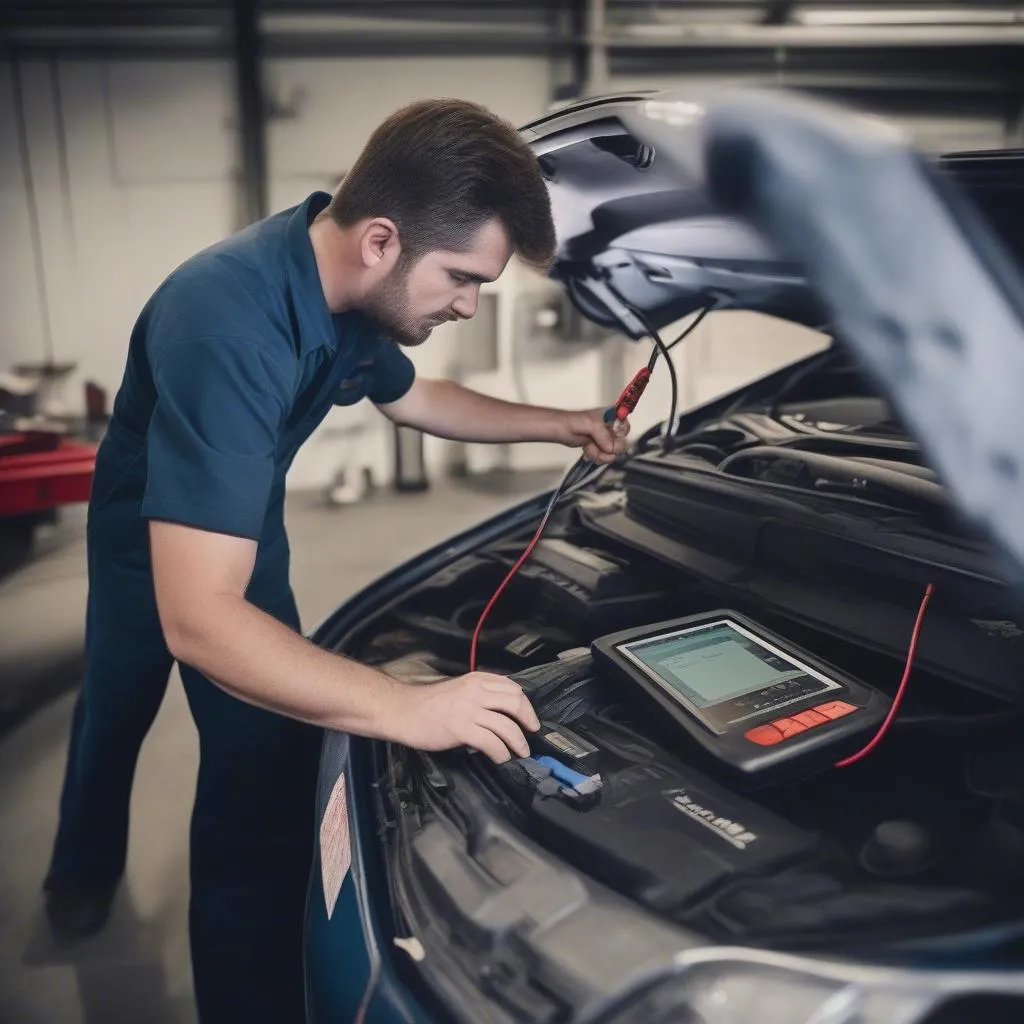The brake warning light on your Dodge Stratus is a crucial safety feature that shouldn’t be ignored. When illuminated, it signals a potential problem with your vehicle’s braking system that requires immediate attention. This article delves into the common causes of the Dodge Stratus brake warning light and provides a comprehensive guide to help you troubleshoot and potentially resolve the issue.
Understanding Your Dodge Stratus Brake Warning Light
The brake warning light, often a red circle with an exclamation mark or the word “BRAKE” inside, can illuminate for several reasons. Some issues are minor, while others can indicate a serious safety hazard.
Common Causes of a Dodge Stratus Brake Warning Light
Here’s a breakdown of frequent culprits behind a lit brake warning light:
-
Low Brake Fluid: This is the most common cause. Brake fluid is the lifeblood of your hydraulic braking system. As brake pads wear down, the fluid level naturally drops. However, a sudden or significant drop could point to a leak, which needs immediate attention.
-
Worn Brake Pads: Brake pads are designed to wear down over time. When they reach a certain thickness, the brake warning light is triggered as a reminder to replace them.
-
Faulty Brake Light Switch: The brake light switch, located near the brake pedal, activates the brake lights when you depress the pedal. If this switch malfunctions, it can cause the brake warning light to come on.
-
ABS Issue: If your Dodge Stratus is equipped with an Anti-lock Braking System (ABS), a problem with this system can also illuminate the brake warning light. This could be due to a faulty sensor or a problem with the ABS module.
-
Parking Brake Engaged: It may seem obvious, but sometimes the simplest solution is the right one. Ensure the parking brake is fully disengaged.
Troubleshooting a Dodge Stratus Brake Warning Light
Here’s a step-by-step guide to help you troubleshoot the issue:
-
Check Your Parking Brake: Start with the basics. Make sure the parking brake is fully disengaged.
-
Inspect Brake Fluid Level: Park your car on a level surface and locate the brake fluid reservoir under the hood. The reservoir will be translucent, allowing you to visually check the fluid level. If the fluid level is low, add the recommended brake fluid for your Dodge Stratus (check your owner’s manual) but don’t ignore the underlying cause. Low brake fluid often indicates worn pads or a leak in the system.
-
Visually Inspect Brake Lines and Hoses: Carefully examine the brake lines and hoses running from the master cylinder to each wheel for any signs of leaks, cracks, or damage. If you notice any fluid leaks or damage, it’s best to consult a mechanic immediately.
-
Check Your Brake Lights: Have a friend or family member press the brake pedal while you observe if both brake lights illuminate. If the brake lights aren’t working, it could be a faulty brake light switch, a blown fuse, or a wiring problem.
-
Consider Your Driving Experience: Did you feel any changes in braking performance? For instance, did the brake pedal feel spongy, did you hear any unusual noises when braking, or did the car pull to one side when braking? Noting these details can help a mechanic diagnose the issue more accurately.
When to Seek Professional Help
While some issues with the brake warning light can be addressed with basic troubleshooting, it’s important to remember that brakes are a critical safety system. If you’re unsure about any aspect of the diagnosis or repair, it’s always safest to consult a qualified mechanic.
2004 dodge stratus brake warning light issues can be particularly challenging to diagnose without proper equipment. If you suspect a problem with your 2004 Dodge Stratus, seeking professional help ensures a correct and safe repair.
The Importance of Timely Brake System Maintenance
Regular maintenance is key to preventing brake system problems. Follow your Dodge Stratus’s recommended maintenance schedule and have your brake system inspected by a qualified mechanic at least once a year or as recommended in your owner’s manual.
“Addressing brake issues promptly not only keeps your car running smoothly but also provides peace of mind knowing your vehicle can stop safely when needed,” says John Davis, a seasoned automotive technician with over 20 years of experience.
Conclusion
A glowing brake warning light on your Dodge Stratus should never be ignored. By understanding the common causes and following the troubleshooting steps outlined in this article, you can take the first step towards addressing the issue. Remember, when it comes to brakes, erring on the side of caution and seeking professional help is always the safest course of action. Maintaining your vehicle’s braking system ensures optimal performance and, most importantly, your safety on the road.

